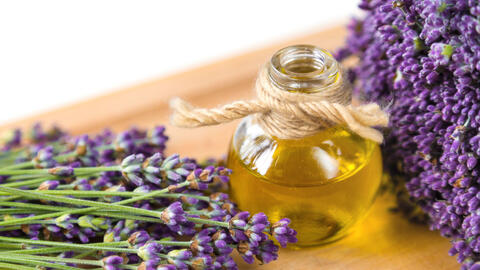Making lavender oil: Preserve the scent of the south
Do you love lavender? With these simple instructions, you can transform these fragrant blossoms from your garden into aromatic lavender oil.

Lavender oil brings the scent of summer
For centuries, the Lavender fragrance has been one of the most popular and well-known fragrances worldwide. In ancient times, lavender oil and the blooms of the subshrub were valued as bath and cosmetic additives and even used for medical purposes. It is not a coincidence that the name Lavender stems from the Latin word "to wash" (lavare). Preserving the lavender fragrance and with it the scent of summer, for the rest of the year. In the form of lavender oil, the fine fragrance is still widely used in food and cosmetic products. We will show you how you can make fine aroma oil with lavender.

With more than 280 ingredients, English Lavender oil is highly valued. The lavender aroma is proven to have a calming, stress-reducing and vitalising effect on our organism through the linalyl acetate fragrance component it contains. The higher the proportion of this special ester, the higher the quality of the lavender oil. With 52 percent ester content, the lavender oil "barreme" is considered to be the best in the market. This inexpensive lavender oil contains 30 percent linalyl acetate. The essential oils contained in lavender oil have a regulating effect on the limbic system, where they promote relaxation and well-being. Negative thoughts are easier driven away and it becomes easier to calm down. In ancient Rome lavender was also a well-known aphrodisiac. In an oil burner or dripped on, the lavender scent is also said to help repel mosquitoes and cats.

Not all types of lavender are suitable for the production of authentic lavender oil. The strongly fragrant and fruitful lavendula angustifolia (English Lavender, France) or Lavandula latifolia (Spike lavender, Spain), or their crossbreeds - the hybrid varieties (Lavandula x intermedia) - are used for oil production. The exact selection of species and varieties differs according to the area of cultivation and the intended use, whereas oil made from intermedia lavender, known as lavandin oil, and spiked oil made from spiked lavender are considered inferior to that of English lavender. Lavender is harvested early at midday when the scent is at its most intense. Since the concentration of aromatic substances is highest in the blossom, only lavender blossoms are used to produce pure lavender oil. In order to obtain pure, medically effective lavender oil, the oils in the lavender must be distilled with steam in an elaborate process. Lavender blossoms are heated in water in a distillation flask to release the fragrance constituents. The resulting water-oil mixture evaporates and travels through a cooled pipe into a collecting tank. As the lavender oil is not soluble in water, it floats on the water in the collection container. After cooling down and is carefully extracted. The yield is low: Per litre of pure lavender oil you need 20 to 40 kilograms of lavender flowers, from wild mountain lavender even up to four times as much. Pure lavender oil is therefore precious and expensive.
Unfortunately, making English lavender oil yourself is not an option for several reasons: First of all, it is difficult to get the large quantities of high quality lavender flowers needed for the distillation. In addition, larger quantities require an expensive distillation plant, as is also used for the production of highly concentrated alcohol. Therefore it is better to buy English lavender oil in specialist shops or in pharmacies.

However, there is an alternative to English lavender oil - it is even easy to make and in most cases sufficient for use at home as a bath or massage oil: With a little fresh lavender and a high-quality virgin cooking oil you can easily make your own lavender scented oil. To do this, pour a tablespoon of fresh or dried, lightly ground lavender flowers into a sealable glass jar and fill it with 6-7 Oz of safflower, almond or olive oil. It is best to use a fragrance-neutral oil, so that the lavender aroma is optimally accentuated. However, sunflower oil is not recommended as it quickly becomes rancid. Let the mixture steep for about six to eight weeks. Shake the jar vigorously every few days so that the essential oils dissolve well from the flowers and dissolve into the oil. Lastly, pour the flavoured oil through a fine sieve or cloth into a dark, easy-to-close glass bottle - and your homemade lavender oil is ready. But always produce only as much oil as you use within half a year and store it as cool and dark as possible so that it does not become rancid. Tip: Well-dried lavender blossoms can be stored in a sealable jar in a dark and cool place for several months without losing any significant aroma. With these blossoms you can still make new lavender oil in winter.

In addition to the traditional uses as perfume and scented water, lavender oil is a versatile agent in aromatherapy. Lavender oil is also used as a room fragrance or freshener that helps with sleep disorders and headaches. For a relaxing scented compress, soak a small cloth in cold water and drizzle two drops of lavender oil and four drops of peppermint oil on it. Then place the towel on your forehead and take a deep breath. A few drops of lavender oil on the pillow or a warm bath with lavender additives will help you fall asleep. With its cooling, antiseptic effect, it can also be used as a insect bites insect bites and mild sunburn. Simply dab it onto the affected areas with a clean cloth.
In the kitchen you can use lavender oil to flavor food and beverages. A note of caution: Essential oils can cause health problems for asthmatics, allergy sufferers and people with impaired lung function. Infants should not be brought into direct contact with essential oils either.



